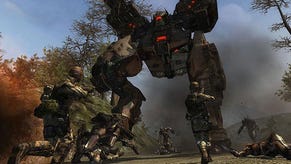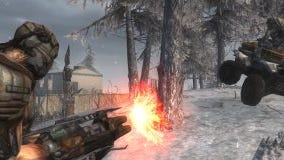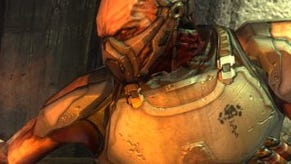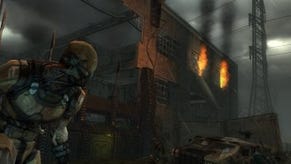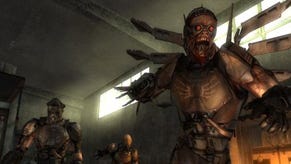RPS Interview: Splash Damage
Sat around a table on the mezzanine of a poncey San Francisco hotel were Rock, Paper, Shotgun's international agent, Jim Rossignol; PC Gamer's poseable action editor, Tim Edwards; and droopy-fringed Official Xbox 360 Magazine editor and frequent PC Gamer contributor, Jon Hicks. Joining them for man-to-man chat were three members of the UK-based Enemy Territory: Quake Wars development studio, Splash Damage: Owner and lead designer, Paul Wedgwood; business development director, Steve Gaffney; and Splash Damage's newly promoted art director, Richard Jolly. They all had a nice chat about running a game community, the tribulations of game development, the PC, and how the game that follows ETQW could be "deeper yet more accessible".
Jim: Splash Damage, your game is done, what are you up to now?
Wedgwood: We're just finishing off another update for Quake Wars. We just did 1.4, which went down really well, particularly because it had loads of accessibility stuff in there. It's still a very deep game, a very complex game, and we found that people just weren't reading the text prompts. Not everyone, of course, but most people weren't reading them. We felt that might be a reason why the number of people who had bought the game hadn't sustained the number of people actually playing the game. We released another demo with some more accessibility stuff in there and it has made a huge difference. The community is growing and, four months after release, we're back in the NPD top ten for PC games.
Of course we also broke something in putting out the update, so we're also putting out an update for the update. Typical!
The other thing was death feedback. We've added the lock warning you get from being in a vehicle to the anti-personnel turrets. Newbies still panic and die, but they know how they died. That's enormously important. It's only if you understand how and why death and incapacitation occur that you can react and adapt and do something about it.
A little more tweaking this stuff, and we're otherwise done with ETQW.
Jim: How has it been running the community for your own game, rather than someone elses?
Wedgwood: Well, Id Software have been enormously useful mentors for us, in terms of running a studio, art, technology, everything. But we're finally in the position where we can do something on our own. The same is true on the community side. We've worked hard to get as many people on the forums as possible, and then promote community members so that it can become self-policing. We don't really ever wade in there, and we never defend ourselves. People can come round and make whatever accusations they like. If it's unreasonable then someone in the community will defend us, and it's a fair accusation then we have to make a note and learn from it.
Gaffney: It's a really clear communications channel for us. There was a delay with one of the recent updates, which was the EULA that had to be signed off before release. Rather than just going quiet or whatever we just told them what it was. We explained the delay right there.
Wedgwood: People were shocked that we'd just say “Oh we messed up the legal agreement, sorry!” But the community appreciate it. Steve Hessell, our community manager, used to work for Ritual. He had to maintain a small community's enthusiasm for years, so he's be enormously useful to us. It's the little things that are invaluable.
We're also into supporting the fansites. If you're going to post all your worthwhile news on a community site like the one we have then there's no reason for people to go to community sites, so we trying to make compromises and support those sites wherever we can.
Jim: You're recruiting heavily now, but to what end?
Wedgwood: Well we're already working on an unannounced action title. We can't say what that is yet because we've not signed with the publisher, but we're in the closing hours of the contract. To do what we want to do next, which is a big, evolutionary step in design, we do need to grow the team size a fair bit. We want to manage and control the different platforms in house, and it's a really good time for that. We've always lead on PC, because you can prototype a game really quickly compared to the consoles. If you want to balance really well you do it on PC first, and then it's set up for console. If you do it the other direction it can go really badly. A port from console to PC doesn't always go well. Being a position where we can handle everything across three platforms is a really valuable position for a developer, and that's a position we've basically come into by luck, pure the-stars-are-aligning stuff. It's really important because we can make sure we have something three to six months that works and is fun on the PC, and then, because the metrics or art assets and everything else are similar on the consoles, we can pick and choose how we go forward, and we can do everything ourselves. We don't have to rely on different studios developing completely different code.
What we want to do next is to create something entirely different [to ETQW] to prove that we can do something original, from scratch. But we've realised that to do this we can't rely on recruiting so heavily from the mod-making community. That worked pretty well for PC when that was exclusively what we were working on, and also the time – five years ago – when so many community members had really good experience of the kind of high-poly modelling tech we were interested in. We're still interested in getting the people who are creating things on their PC into the junior positions, but we now know that we have to get people with next-generation console experience because things like certification are just so difficult.
Tim: CliffyB said the PC platform is in disarray, how do you feel about that? (Although he's started backtracking by the time this article was written - Ed)
Wedgwood: I don't see eight million World Of Warcraft subscribers as a platform that is in disarray. Personally I think that RTS, MMO and shooters, mostly, are better on PC. That's something that's very clear to us. How people come to adopt that is the tricky part. They probably get a PC so they can use Facebook or YouTube and then end up doing some PC gaming. The online part of PC gaming is absolutely in growth, not decline. The challenge for PC developers is to figure out why the things that work, work. There's no reason why developers should abandon these PC models and think the PC doesn't have a future – these kinds of games /work/ and the trick is to make them work consoles too.
Jim: What do you think about Steamworks?
Gaffney: It's great. We need someone to look after the PC platform, and only Valve are really in a position to do that. There's no downside to it.
Wedgwood: And there's a big upside for Valve – to control the PC platform via more Steam subs. But that is a positive thing for other developers.
Hicks: You're not worried that Valve could turn around and start holding the platform to ransom?
Gaffney: Perhaps, but Steam is like a third platform now. It's that big. There's the 360, the PS3 and Steam... Do you not think?
Tim: I completely agree, I've just never heard anyone say it out loud. Every game I know has a Steam account, and uses it regularly.
Jim: So anyway, what do you guys get out of GDC?
Wedgwood [looking at the massive box full of recruitment flyers he's been lugging about]: Well, we've got two and half thousand recruitment flyers to distribute. I'm also here as a speaker, doing a talk called “From Amateur to AAA in Five Years.” I don't really have a plan, other than I want to see if I can use all twenty four font effects in Powerpoint. I should probably think about what I'm going to say. But we have a whole bunch of people here at GDC, and they're going to be attending seminars and tutorials.
Out speech isn't really about game design, it's more about how to handle yourself has a studio. Ten simple, elegant statements that you can use in making financial decisions, talking to the press, and so on. Some of them are counter-intuitive too, things like “don't budget” and “love your publisher.”
Hicks: On your next game, then, you're going to have a different focus, in terms of developing for 360 and PC at the same time?
Wedgwood: Well that's hard to quantify. A third of our effort is going to be on accessibility. We're not anticipating our next game being any less complex, but the goal is to improve the accessibility through the interface, or lack thereof. We won't be nerfing the game down, it could be even deeper than Enemy Territory.
Tim: Is there a studio you model yourselves on?
Wedgwood: Id have always been the people we've been in awe of. We've played all their games, and followed their lead. Valve too are just incredible.
Gaffney: But there hasn't been a Splash Damage before, we can't actually “model” ourselves on anyone else in a sensible way.
Wedgwood: There are only two things that Splash Damage aims for, and it all boils down to these two simple principles: pursuit of critical acclaim for its own sake, and making sure the staff can pay their rent. If we can achieve those two, everything else is a bonus. We focus on this because we have little influence over anything else. Game developers can make this game that they're supremely happy with, but it'll still do badly if it's badly received or misunderstood, or distributed and marketed badly. You can pursue critical acclaim unashamedly by making a good game. You start a rock band because you want people to love you and their music. You don't go trawling round Manchester pubs for any other reason. The same is true of games.
Tim: What happens when reviews come in then?
Wedgwood: I go nuts. But we're really lucky, for ETQW we've had thirty review scores that are over 90%. And we've had ninety awards and nominations, it's been really good.
Tim: Can you review score your game? Can you be objective?
Wedgwood: Yes!
Rest of team: No! [Laughter]
Wedgwood: Well, I think if we knew what we knew now about accessibility and we had solved that problem then ETQW would have deserved low nineties. As it is it's deserves eighty seven to ninety sort of area, and that's exactly where we are. I think I can say that because I say it about the team. As a designer I'm a Microsoft Worderiser, everyone else actually made the game happen. I don't mind spouting about how cool the game is, because I want to spout about what they've achieved.
The ETQW demo can be found here.


